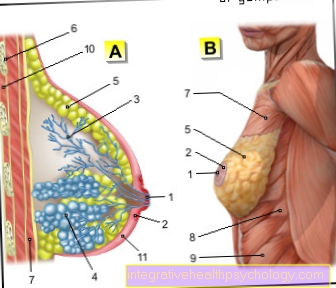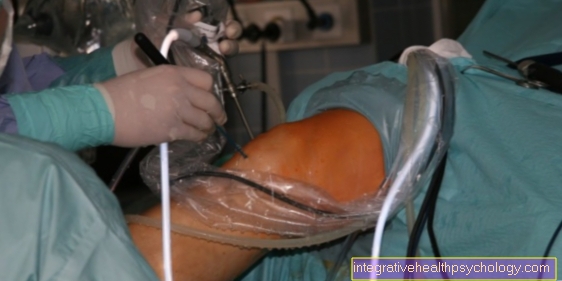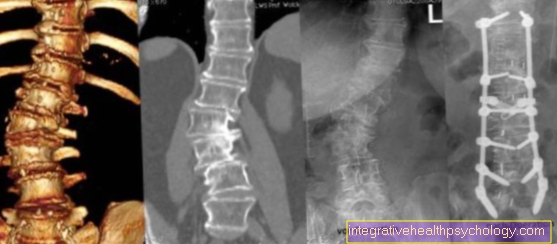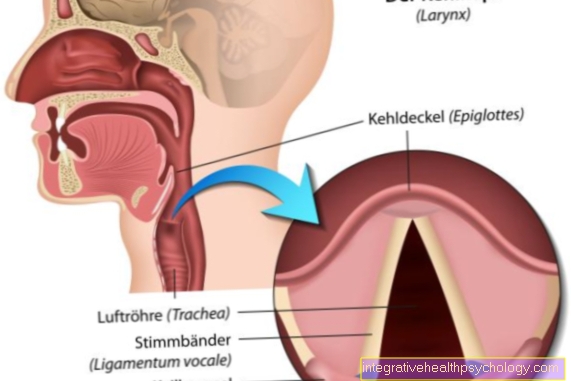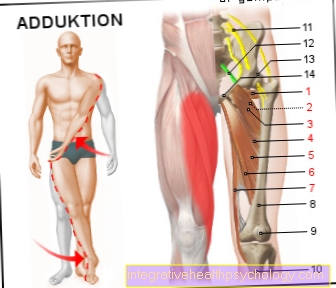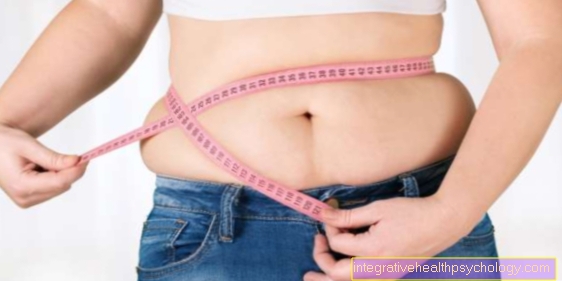Lose weight while breastfeeding
introduction
During breastfeeding there are additional demands on the maternal organism, which not only has to recover from childbirth, but also has to produce milk.
The female body meets these tasks with an increased need for calories during breastfeeding, which is between 500 and 600 more calories per day. If the woman's diet is balanced and the calorie requirement is sufficient, weight loss will result. With this, the female body already sets the course for a slow but gentle weight loss. This is a natural process and is harmless.

Can you lose weight while breastfeeding?
We strongly advise against supporting the weight loss process through radical diets, one-sided nutrition or resuming intense sporting activities too early shortly after delivery. However, in addition to the natural processes, further weight loss can occur during breastfeeding. This should be done slowly and gently and not cause malnutrition.
After a sufficiently long recovery phase of at least six to eight weeks after the birth, light sporting exercises can be carried out to support a change in diet. Above all, postnatal gymnastics is recommended.
However, natural weight loss due to an increased calorie requirement should not be used to reduce the calorie intake even further in order to accelerate the weight loss effect.
In addition, the maternal weight should be checked regularly, since inadequate nutrition can inadvertently lose too much weight due to the increased calorie requirement. A change in diet to wholesome and nutrient-rich foods could therefore be useful.
A drastic reduction in maternal food intake can lead to a reduction in milk production and also impair the quality of the milk, as the content of nutrients can be negatively affected. Furthermore, if there is radical weight loss during breastfeeding, harmful substances can be released from the mother's fat deposits and migrate into breast milk. In addition, when doing very intensive sports exercises, on the one hand, the maternal body, which has been stressed by childbirth, can be stressed too much; on the other hand, the lactate content in the female body can rise and pass into breast milk. This is then changed in taste and the infant may refuse to drink.
What is the best way to lose weight?
In order to lose weight while breastfeeding, the methods that slowly and gently reduce the mother's weight and pose no danger to the mother or the child are suitable.
If a change in diet has not already taken place during pregnancy, this could now be useful. Vegetables, fruits and whole grain products, among others, should play an essential role.
At first glance, a full diet may seem too rich in weight loss plans. However, it is the best basis for optimal breast milk production and can still lead to weight loss due to the increased calorie requirement during breastfeeding.
In addition, after a sufficiently long period of rest after childbirth, usually around six to eight weeks, you can begin with light sporting exercises to support weight loss. Here, too, the gentle and slow approach has top priority in order not to avoid any health risks. This is especially true after a caesarean section, in the case of dam injuries or birth complications.
Postgraduate gymnastics is a gentle way of doing sport. At first glance, this does not seem sweaty enough to achieve significant weight loss. However, it is generally not advisable to lose weight too quickly.
Post-op exercises are an ideal way to prepare the body for subsequent, more intensive training units and to minimize the risk of injury. However, intensive exercise should only be started after weaning, in order to avoid excess lactate and acidification of the milk. Therefore, low-intensity sports should be chosen, such as swimming. Walks at a higher walking pace can be integrated relatively easily into normal everyday life and represent another option for increasing calorie consumption.
In principle, it is important to give the body time and to choose gentle and harmless weight-loss options with patience. Ambitious and faster weight loss should only occur after weaning the child.
Exercise after the birth? Get information here.
How much can I lose weight while breastfeeding?
If you want to lose weight while breastfeeding, this should be approached slowly and gently.
First and foremost, it is important not to endanger your own well-being and not to have a negative impact on the health of the child through breast milk. We therefore strongly advise against radical weight loss in a short period of time, as this is associated with unwanted risks and consequences, especially for the child.
Many breastfeeding mothers lose weight all by themselves through the natural need for more calories during breastfeeding. This depends on the maternal diet, but also depends on the metabolism, the original weight and the weight gain during pregnancy.
Diets should be avoided completely while breastfeeding and a balanced, healthy diet should be sought. Weight loss of around one to two kilograms per month is considered harmless during breastfeeding. It is a very slow process, but it is gentle on mother and child and poses no health risk.
Larger weight reductions planned during the period of breastfeeding should be discussed with the gynecologist, as the harmless weight loss is also related to the increase in weight during pregnancy and may be larger or smaller.
In general it can be said that patience should be exercised! Radical diets and greater weight reductions through intensive training should only be aimed for after the end of breastfeeding in view of the child's well-being.
Read more on the topic: Behavior during breastfeeding.
Which sports are particularly good for losing weight while breastfeeding?
As in almost all phases of life, sporting activity while breastfeeding is an important and sensible way of doing something for your health. Many people have the primary goal of losing weight through exercise. However, they are not aware of the fact that exercise has many other benefits. This also applies to breastfeeding, where excessive weight loss is not recommended anyway. However, that does not mean that you should avoid exercise entirely or postpone it until after weaning.
Post-pregnancy recovery exercises should be performed by every woman as they slowly return the body to its pre-pregnancy state. In addition, light sports exercises such as walking, faster walks, simple yoga, cycling or swimming offer ideal opportunities to move the body again. These sports can gently support the weight loss process and boost calorie consumption.
If breastfeeding women have a balanced diet, moderate exercise does not have a negative impact on breast milk. In addition, it offers a balance to the new demands in everyday life that a newborn brings with it.
When resuming sporting activity, care should be taken to ensure that at least six weeks have passed after the birth so as not to stress the body too much. In addition, attention should be paid to physical signals and the training intensity should be reduced in the event of pain or exhaustion.
A good orientation option for choosing the intensity of the training is to sweat slightly without getting out of breath. Conversations should still be possible.
The ideal time to get active is after breastfeeding. As a result, the breasts are emptied and do not tense during exercise.
Lose weight with exercise? - These exercises are particularly effective.
Does a diet harm breast milk?
Many women have a desire to return to their original weight after gaining weight during pregnancy. It often seems helpful to go on a diet.
However, many diets involve risks, as they have a negative impact on breast milk if there is insufficient or one-sided nutrient supply and its quality is impaired. In particular, diets with a drastic reduction in carbohydrates or fats or even a diet only containing proteins carry the risk of a child's deficiency. A sufficient supply of nutrients and vitamins is essential for the proper development of the child. This applies, for example, to B vitamins, folic acid, iodine, selenium, vitamin A, calcium and various fatty acids.
In addition, diets can lead to reduced milk production if the maternal weight is lost too drastically.
In addition, radical weight reduction attacks the maternal fat reserves. However, these can contain various pollutants that are fat-soluble in nature and thus accumulate in the fat deposits. When the calorie intake is reduced, the body's fat reserves are opened to generate energy and the pollutants are released from the fatty tissue. These can then pass to the child via the high-fat breast milk.
Accordingly, a diet is only worth striving for if there is a moderate weight reduction and the nutritional requirements are adequately met. In addition, a diet can be useful if a healthy lifestyle is sought and it is a positive change in nutrition to wholesome, high-fiber and balanced foods. More radical diets should be postponed until after weaning.
Read more on the topic: Diet while breastfeeding
Can I use Weight Watchers while breastfeeding?
Weight Watchers has a diet plan that is tailored to the needs of breastfeeding women. This contains higher calorie counts than a regular diet plan from the company, also depending on whether the child is fully breastfed or already fed.
Since the calorie requirement is increased during pregnancy, the nutrition plan meets the increased demands of the body. A breastfeeding woman can use Weight Watchers in the course of her weight loss plans, but as with any planned diet during breastfeeding, she should follow certain rules. The weight loss should not be too strong in order not to have any influence on milk production, which can lead to a reduction in the quality and quantity of breast milk if there is an excessive reduction in food or a one-sided diet.
In addition, generally applicable recommendations should be followed, such as an adequate fluid intake of at least two liters per day, the integration of fruits and vegetables into the meal plan and the use of dairy products and oils to ensure the supply of essential fatty acids.
With a wholesome diet, breast milk contains all the nutrients that are important for the child and is the best food for the infant. If you want to take part in a Weight Watchers diet while breastfeeding, it may be worthwhile to obtain the necessary information from the company in advance. You can then consult a doctor and discuss the diet plan.

